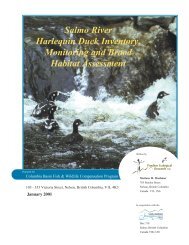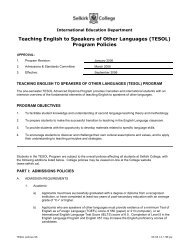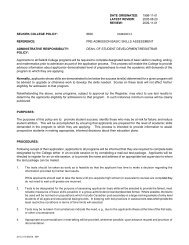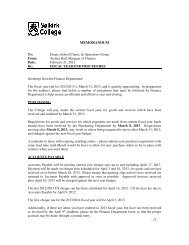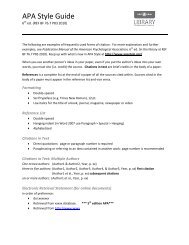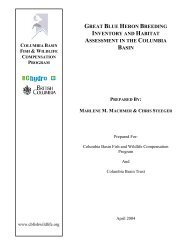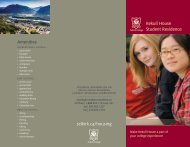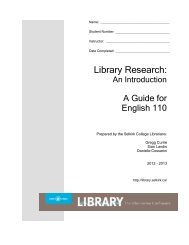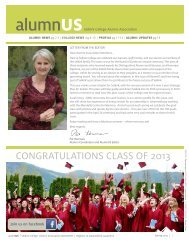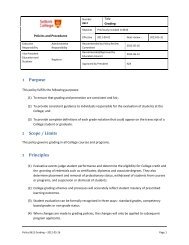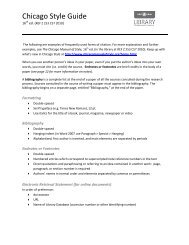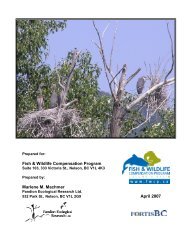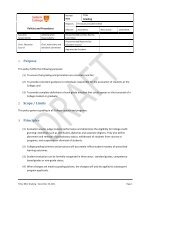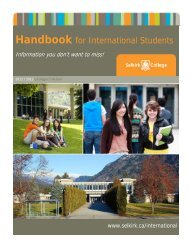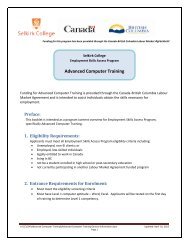selk irk.ca - Selkirk College
selk irk.ca - Selkirk College
selk irk.ca - Selkirk College
You also want an ePaper? Increase the reach of your titles
YUMPU automatically turns print PDFs into web optimized ePapers that Google loves.
Early Childhood Care and Edu<strong>ca</strong>tion<br />
• résumé.<br />
• A completed health information form<br />
• Documentation of successful completion<br />
of 60 hours of supervised paid or volunteer<br />
work with groups of young children.<br />
• Completed Selk<strong>irk</strong> <strong>College</strong> appli<strong>ca</strong>tion form.<br />
• Completed criminal record check.<br />
• All appli<strong>ca</strong>nts must complete assessment<br />
tests in reading, writing and math before<br />
registration.<br />
• Two completed personal reference forms.<br />
• Driver’s license is recommended.<br />
N.B. A scheduled orientation and interview<br />
session with Early Childhood Care and Edu<strong>ca</strong>tion<br />
instructors will be held to discuss the nature of the<br />
ECCE program and requirements for practicum<br />
placements.<br />
Notes<br />
• Students may apply for a license to practice as<br />
an ECE Assistant after successful completion<br />
of 1st semester (ECCE 186).<br />
• The Early Childhood Care and Edu<strong>ca</strong>tion<br />
Certifi<strong>ca</strong>te program is the prerequisite for<br />
post-basic training programs.<br />
• All students must earn an approved First-Aid<br />
certifi<strong>ca</strong>te prior to receiving their Early Childhood<br />
Care and Edu<strong>ca</strong>tion certifi<strong>ca</strong>te.<br />
• In addition to usual expenses for fees and<br />
books, students have added expenses for<br />
regular travel to area early childhood centres.<br />
Individuals enrolling in the program are<br />
advised that access to a reliable vehicle is<br />
necessary as travel to centres is the responsibility<br />
of the student.<br />
Program Courses<br />
ECCE 168 Clini<strong>ca</strong>l Practicum I<br />
This course provides students with practi<strong>ca</strong>l<br />
experience in observing and recording childrenís<br />
individual abilities and interests over time. The<br />
course is designed to integrate theories and<br />
practices in the ECCE field. Students observe and<br />
participate in child <strong>ca</strong>re programs in the region.<br />
Reflective practice and professional conduct are<br />
developed.<br />
ECCE 178 Foundations of<br />
Professional Practice I<br />
This course provides an overview to the role<br />
of the professional in early childhood <strong>ca</strong>re and<br />
edu<strong>ca</strong>tion. Learners are supported in examining<br />
personal values, beliefs and assumptions about<br />
young children, families and services for children<br />
and families.<br />
ECCE 186 Child Health and Safety<br />
The focus of this course is on personal wellness<br />
and the planning, establishment and maintenance<br />
of a safe and healthy environment in programs for<br />
children from birth to school age. Topics include:<br />
food preparation and handling; planning nutritious<br />
snacks and meals; diapering and toileting;<br />
accident prevention and hazard identifi<strong>ca</strong>tion;<br />
medi<strong>ca</strong>tion; illness management and assessment;<br />
modeling healthy practices and utilizing community<br />
health resources.<br />
This course is available via Distance Edu<strong>ca</strong>tion.<br />
ECCE 188 Responsive Child-<br />
Centered Environments<br />
This course provides opportunities to learn<br />
about warm, <strong>ca</strong>ring, responsive relationships<br />
and emotionally safe child-centered environments.<br />
Students explore the areas of art, music,<br />
movement and drama within the conceptual<br />
frameworks of developmentally appropriate practice,<br />
the competent child, diversity, child-centered<br />
environments, sensory motor exploration,<br />
emergent curriculum and creativity.<br />
FAM 180 Family Dynamics<br />
This course is designed to provide students with a<br />
variety of theoreti<strong>ca</strong>l perspectives to understanding<br />
families. It considers the diversity of families<br />
including exploration of cultural differences,<br />
same-sex parents, single parents and blended<br />
families. The role of marriage is examined, as well<br />
as childbearing and socialization. Issues such as<br />
middle age, empty nest, aging in the family, and<br />
special concerns such as chronic illness, disability,<br />
alcoholism, violence, and poverty are introduced.<br />
Prerequisites<br />
ENGL 12 or equivalent.<br />
HSER 174 Interpersonal<br />
Communi<strong>ca</strong>tions<br />
Provides the student with an opportunity to<br />
examine personal goals, values and attitudes;<br />
develop and practice listening and responding<br />
skills, and become more aware of personal<br />
strengths and limitations. Designed to help gain<br />
self-understanding in order to be more effective in<br />
working with people.<br />
PSYC 100 Introductory Psychology I<br />
An introduction to the methods, theory and<br />
practice of psychology as a science. Among others,<br />
topics will include motivation and emotion,<br />
learning and memory, biologi<strong>ca</strong>l foundations,<br />
sensation and perception. Other topics are added<br />
at the discretion of the individual instructor. Class<br />
demonstrations and activities are used to illustrate<br />
concepts. Teaching methods and resources in the<br />
course vary with the instructor.<br />
Prerequisites<br />
ENGL 12 or equivalent with a grade of “C” or<br />
better or written permission of the Instructor and<br />
School Chair.<br />
This course is available via Distance Edu<strong>ca</strong>tion.<br />
ECCE 169 Clini<strong>ca</strong>l Practicum II<br />
This course provides students with practi<strong>ca</strong>l<br />
experience in observing and recording childrenís<br />
individual abilities and interests over time. The<br />
course is designed to integrate theories and<br />
practices in the ECCE field. Students observe and<br />
participate in child <strong>ca</strong>re programs in the region.<br />
Reflective practice and professional conduct are<br />
developed.<br />
Prerequisites<br />
All fall semester courses.<br />
Corequisites:<br />
ECCE 186 and ECCE 193.<br />
ECCE 179 Foundations of<br />
Professional Practice II<br />
This course provides an overview of the field of<br />
early childhood edu<strong>ca</strong>tion from a philosophi<strong>ca</strong>l<br />
perspective. An ecologi<strong>ca</strong>l approach is used to<br />
explore issues such as diversity, personal and<br />
professional ethics, legal requirements and other<br />
factors relevant to children, families and child<br />
<strong>ca</strong>re environments. Students examine anti-bias<br />
principles and approaches to working with young<br />
children. By exploring their own adult role in<br />
play environments, learners will integrate thinking<br />
regarding philosophies of least restrictive environments<br />
and inclusionary practices.<br />
ECCE 189 Responsive Child-<br />
Centered Environments II<br />
This course builds on the concepts and theories<br />
of ECCE 188 with an emphasis on play theory,<br />
social relationships and skills, and creative and<br />
cognitive processes in children ages three to six<br />
years. Learners examine the interface of adults<br />
and children in a child-centered environment.<br />
Students learn ways of supporting and extending<br />
the interests, understandings and problem-solving<br />
abilities of young children.<br />
ECCE 193 Child-Centered<br />
Partnerships I<br />
In this course, learners reflect upon values, beliefs<br />
and attitudes towards building warm relationships<br />
with children. Understanding of self within the<br />
guiding relationship is developed. With the use<br />
of problem solving techniques, students learn<br />
the skills of guiding and <strong>ca</strong>ring for children and<br />
creating emotionally safe, respectful environments<br />
that are empowering and that enhance autonomy<br />
and maximize potential.<br />
This course is available via Distance Edu<strong>ca</strong>tion.<br />
114 Selk<strong>irk</strong> <strong>College</strong> 12/13 School of Health and Human Services



